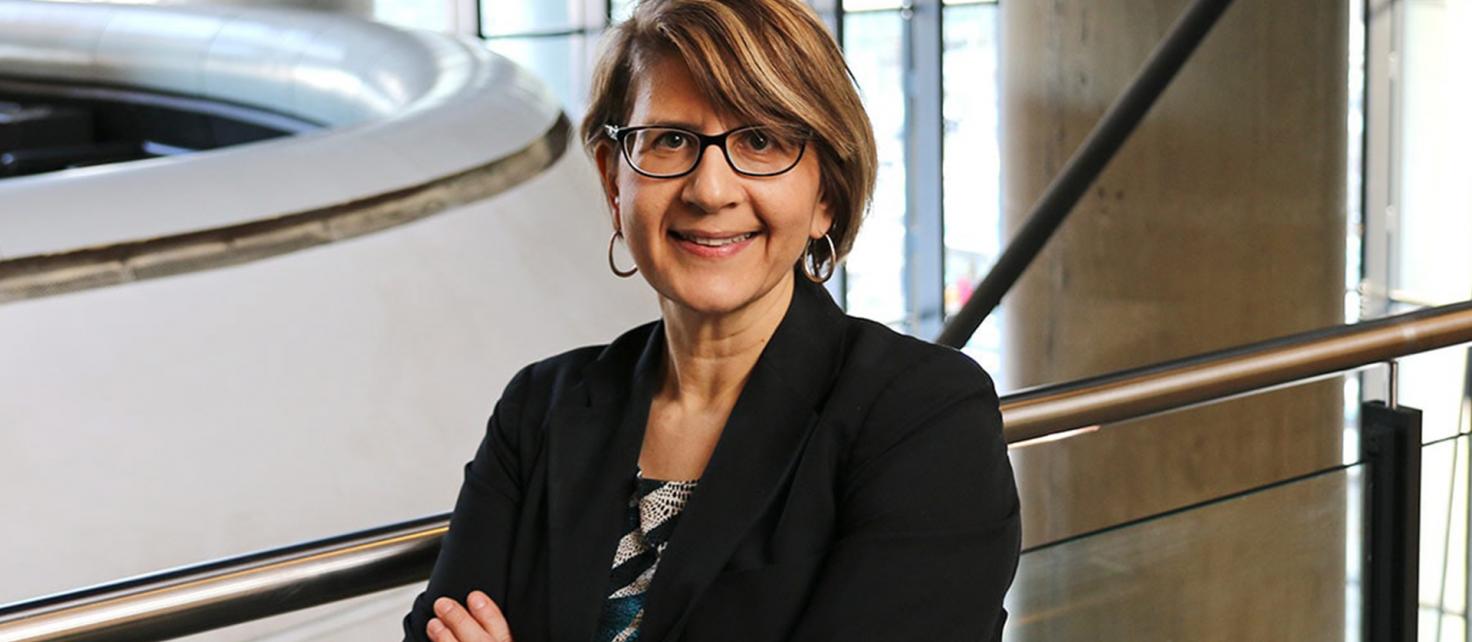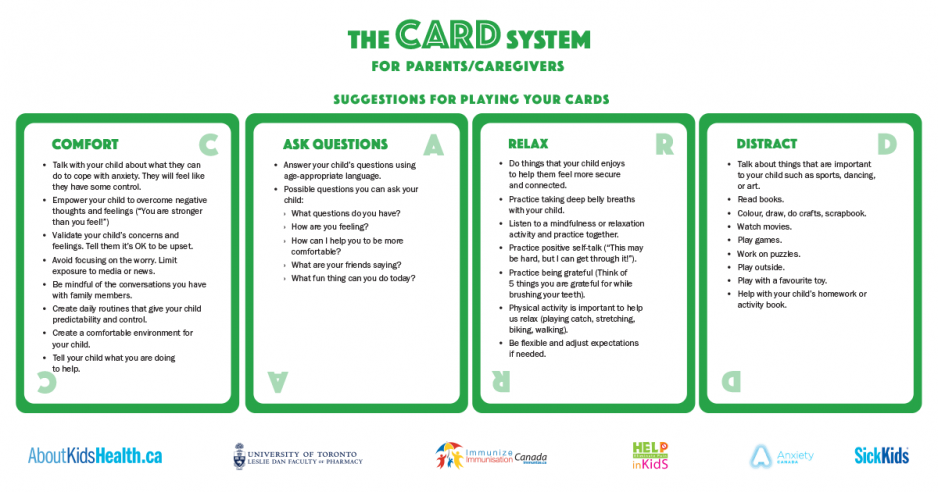When Anna Taddio, professor at the Leslie Dan Faculty of Pharmacy, and her team developed their innovative tool to help children manage pain associated with vaccines and needles, they thought it had potential to be applied in other stressful situations. The COVID-19 pandemic created an urgent need for anxiety management tools, and the team worked quickly to adapt the tool to fill the need.
Taddio, an internationally recognized expert in pain, first developed CARD (Comfort, Ask, Relax, Distract) with a team that included psychologists and pediatricians. This evidence-based tool helps school-aged kids manage pain and fear associated with needle vaccinations.
Each letter or category of CARD includes related techniques to help reduce pain or fear, and the system empowers children to choose approaches that will work for them. For example, a child may ask to be vaccinated in a private room or choose to distract themselves with an electronic device. In clinical trials, Taddio’s team found that CARD reduced rates of fear and dizziness in children receiving immunizations.
With pain and fear covered in the original CARD system, the team reviewed scientific literature and adapted the tool to focus on techniques individuals can use to manage their anxiety during COVID-19.
“Children are not immune from the stresses of the pandemic. Routines that made them feel safe have been turned upside down, they are separated from friends and extended family, and they are worried that their parents and grandparents might get sick,” says Taddio.
Dr. Melanie Badali, a registered psychologist and board director at Anxiety Canada, says that feeling anxiety in certain situations, such as a pandemic, is normal but it can also develop into a more serious anxiety disorder that can affect eating, sleeping and participation in enjoyable activities. In the current context of COVID-19, children can become anxious as they may see their caregivers struggling and feel confused and scared by the stories they see or hear in the media, Badali says.
Anxiety disorders are common in children and youth, affecting one in five at some point during childhood and adolescence. While CARD is not meant to treat anxiety disorders, it is effective for managing acute anxiety.
“We can’t eliminate anxiety from life, especially during COVID-19, but we can equip families with tools such as CARD that can help them cope with anxiety in stressful situations"
“We can’t eliminate anxiety from life, especially during COVID-19, but we can equip families with tools such as CARD that can help them cope with anxiety in stressful situations,” says Badali. “It is important to be able to develop the confidence and skill to tolerate anxiety and to continue with important activities in daily living – this will not only help families make the best out of difficult situations, but it will also paradoxically make the anxiety better.”
CARD gives children control of their situation
The newly adapted CARDs include evidence-based techniques children and adults can use to manage anxiety, such as finding comfort through daily routines that give predictability or relaxing through enjoyable hobbies or physical activity. By organizing the techniques under the four categories, it is easier to remember the techniques and apply them in times of stress.
“It’s an easy way to map everything. You just have to remember these four letters and all kinds of opportunities open up about how you might want to cope with a stressful situation,” says Taddio.
Badali adds that the strategies in CARD are practical and easy for families to do. “In a time when we need concrete, actionable strategies for taking care of our health, CARD is an excellent tool for families,” she says. “You can't choose the hand you are dealt, but you can choose how to play it.”
Dr. Noni MacDonald, a pediatrician and infectious disease specialist at Dalhousie University in Nova Scotia, says that CARD stands out from other anxiety management approaches because of its emphasis on giving children control. Instead of being told what to do, children can choose the techniques they think will work for them, and their choices are valued.
“When you can help people control a situation, they’re much less anxious about what’s going on."
“We know for kids that having choice is really important. We’re just giving them tools they can use, and they pick what’s going to work for them,” says MacDonald. “When you can help people control a situation, they’re much less anxious about what’s going on.”
The adapted CARD system has been shared on the Hospital for Sick Children website and distributed through the Canadian Pediatric Society. Taddio is planning to connect with pharmacists and clinicians to evaluate how the tools have been used and collect feedback on the tool.
During a time when many people, including children, are experiencing high anxiety, simple tools to help them cope are important to maintaining mental health now and throughout their lives.
“We’ve noticed that people actually don’t learn these skills in an active way, but these are important life skills. We all have pain, stress, anxiety and fear,” says Taddio. “Packaging this information in a way that is easy to understand will help children develop skills they can use for their entire life.”
By Eileen Hoftyzer
Learn more about CARD
More News
Image

Dean Lisa Dolovich reappointed for second term
Professor Lisa Dolovich has been reappointed for a second term as Dean of the Leslie Dan Faculty of Pharmacy, University of Toronto, effective July 1, 2025, to December 30, 2030.
Read More
Image

Pharmacy Summer Camp gives high school students insight into pharmacy profession
A new summer camp based at the faculty will give high school students a range of experiences in pharmacy and pharmaceutical sciences.
Read More
Image

Team GloveLift wins 2025 Business Plan Competition with innovative medical device
PharmD students win $5,000 prize for their innovative medical device concept aimed at improving patient care.
Read More

